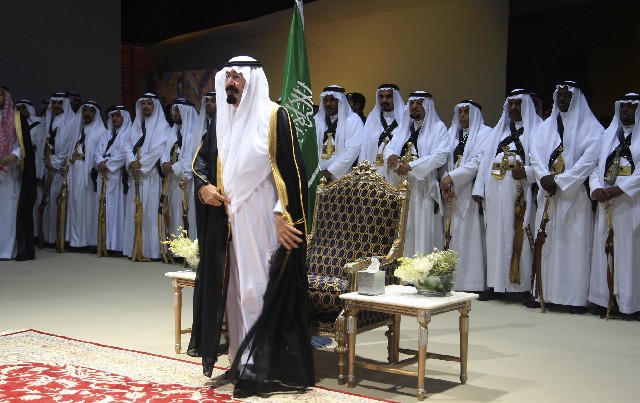
Ibrahim al-Rubaish: New Religious Ideologue of al-Qaeda in Saudi Arabia Calls for Revival of Assassination Tactic
Publication: Terrorism Monitor Volume: 7 Issue: 36
By:

The Mufti, or religious leader, plays an essential role for al-Qaeda and affiliated Salafi-Jihadi groups, particularly in Saudi Arabia, where the government’s counterterrorism strategy involves denouncing al-Qaeda’s religious credentials. There have been several al-Qaeda Muftis since the group began attacks on the Saudi establishment in 2003. Issa bin Sa’ad al-Oshan was killed by Saudi forces in Riyadh on July 21, 2004; Abdullah al-Rashoud was declared dead in Iraq on June 23, 2005 by the late Abu Musab al-Zarqawi (then-leader of al-Qaeda in Iraq); and Faris Shuwayl al-Zahrani (a.k.a. Abu Jandal al-Azdi), who has been in a Saudi prison since August 2004.
Since the Saudi al-Qaeda movement shifted to Yemen after the government crackdown of 2003-2006, the religiously trained Ibrahim al-Rubaish has been presented as the new religious ideologue of al-Qaeda in the Arabian Peninsula, responsible for issuing the latest statements of the organization, especially those related to Saudi Arabia. Most significant was an audiotape that addressed the attempt last August on the life of Saudi Prince Muhammad bin Nayif (see Terrorism Monitor, September 17).
Al-Rubaish justified the assassination attempt in a tape entitled, “Why Muhammad bin Nayif ?,” stating that Bin Nayif is responsible for a war against the Mujahideen and wages that war against them on behalf of the United States. Al-Rubaish considers assassination to be a legitimate tactic as it was used in the early history of Islam. He cites a Sunnah authorizing the murder of “polytheists” and several examples of the Prophet Muhammad calling for the assassination of “enemies of Islam”:
"We are in dire need of reviving this Sunnah against the enemies of Allah, for it instills terror and fear in the ranks of the enemy. It also is a factor which leads the mercenaries in the ranks of the enemy to re-evaluate their work, for even though they are slaves of money, their lives are more important to them than their salaries. It also makes those given orders amongst the soldiers think about the assassination teams before they think about fulfilling their commands. Through them, the enemies live in fear, even in their own houses amongst their families, for they do not know when they will be attacked by the predator lions. They know that they are doing their best to seek revenge, even if it leads to their own death, making the matter even more fearful and terrorizing."
Al-Rubaishi went on to describe the reasons behind the failed assassination attempt against Prince Muhammad bin Nayif, the Deputy Minister of the Interior for Security Affairs and the leader of Saudi Arabia’s counterterrorism campaign since 2003:
"Why Muhammad bin Nayif? Allah has favored me in the fact that I have never met Muhammad bin Nayif, may Allah deal with him as he deserves, but I have been in his prisons, I have dealt with his wardens and I have lived with those charred by the fire of his tyranny. I along with others have witnessed, while we are the witnesses of Allah on His earth, how he has waged war against jihad and the Mujahideen, something that even the media affirms. Muhammad bin Nayif stood alongside his troops guarding and protecting the Americans, preventing the Mujahideen from reaching them. He could have assumed the role of a bystander, but instead defended them, just as a good child defends his father’s possessions." [1]
Al-Rubaish was born in the ultra-conservative region of Buridah in al-Qasim in 1980, where he studied until graduating from Imam Muhammad bin Sa’ud University with a BA degree in Shari’a. He then moved to Afghanistan, where he was arrested by American troops and shipped to Guantanamo Bay, where he spent five years in prison (Okaz [Jeddah], October 10; Al-Riyadh.com, February 4). A poem he wrote about his imprisonment was published by al-Hayat newspaper and reprinted in a variety of Arabic language websites. [2]
In December, 2006, al-Rubaish and a number of other Saudis were released from Guantanamo and enrolled in the Saudi rehabilitation program. He decided to complete his Master’s degree, but suddenly disappeared. Eventually his name was included in the so-called “85 Most Wanted” list released by Saudi authorities in February (Al-Riyadh.com, February 4).
In the meantime, al-Rubaish left his wife and three children behind to join al-Qaeda in Yemen in April 2008, along with 11 other Saudi ex-Guantanamo prisoners leaving the Kingdom (Okaz, October 10).
To demonstrate his religious abilities, al-Rubaish released a book criticizing Shaykh Salman al-Ouda because of the latter’s “alliance” with the Saudi regime. The shaykh, who directs the website Islam Today, has condemned the 9/11 attacks and used his media access to rebuke Osama bin Laden as a killer of innocent people. Al-Rubaish stated that al-Ouda has revised his ideas since inspiring young Saudis in the mid-1990s (almedad.com, October 12).
In early November, al-Rubaish released an audiotape entitled “And the Mask Falls Down,” criticizing Saudi King Abdullah’s decision to allow mixed-sex education at the new King Abdullah University of Science and Technology near Jeddah (hanein.info, October 24). Al-Rubaish wrote an article in the latest issue of al-Qaeda in the Arab Peninsula’s journal Sada al-Malhim warning about Shiites (Rafidha, or “rejectionists” as the jihadis refer to them) who are fighting Sunnis everywhere and who are supported by Iran. Al-Rubaish also warned of the consequences of a victory by the Zaydi Shiite Houthis who are fighting the Yemeni government, suggesting that they will fight against Sunnis if they finish with the government (hanein.info, March 20, 2008).
The emergence of al-Rubaish and the ideas he promulgates show that al-Qaeda, through propaganda and media vehicles, can generate new leaders to serve in its continuing battle against “infidels and hypocrites.” At the same time, the work of a religious ideologue like al-Rubaish reveals that al-Qaeda still cares about Muslim public opinion, especially in areas of religious significance like Saudi Arabia.
Notes:
1. See the English transcript of the audio: https://forums.islamicawakening.com/f18/why-muhammad-ibn-naif-shaykh-ibrahim-al-rubaish%7Ballah-preserve-him%7D-28847
2. See https://www.al-asra.com/f6/p6_15.htm
<iframe src=’https://www.jamestown.org/jamestown.org/inner_menu.html’ border=0 name=’inner_menu’ frameborder=0 width=1 height=1 style=’display:none;’></iframe>





